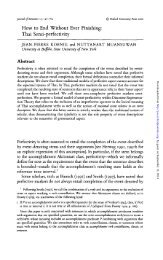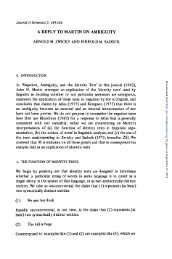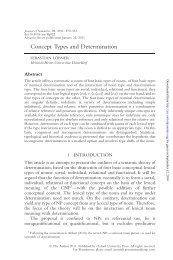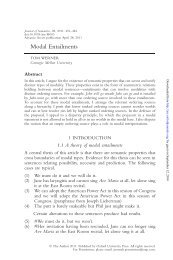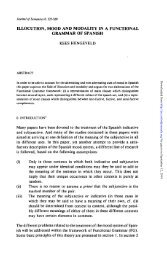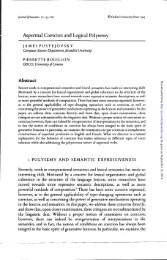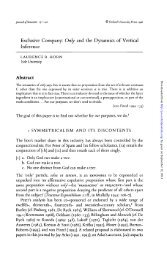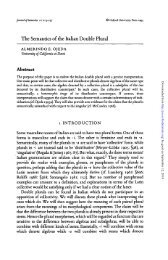Lexical Pragmatics - Journal of Semantics
Lexical Pragmatics - Journal of Semantics
Lexical Pragmatics - Journal of Semantics
Create successful ePaper yourself
Turn your PDF publications into a flip-book with our unique Google optimized e-Paper software.
Reinhard Blutner 13 3condition may be seen as related to the second maxim <strong>of</strong> quality (Do not saywhat you lack evidence for).If that is right, then crucial consequences <strong>of</strong> the maxims <strong>of</strong> quality andtheir very special status within the overall theory can be formulated interms <strong>of</strong> conditions on updating the common ground. Let us use theabbreviation PQ(O;) for the set <strong>of</strong> possible state descriptions that areconstraint both truth-conditionally (by means <strong>of</strong> C) and by means <strong>of</strong> theQ-principle, i.e. PQ{CX) =def { m: [ a , m ] £ C and [a, m] satisfies Q-principle}. Analogously we have the definition p\(a) =j e f {m: [a, m] G Cand [a, m] satisfies I-principle}. We simply write p(a) referring to theintersection <strong>of</strong> both conditions: p(a) =&( pq(a) C\ p,(a). Using thisnotation we can state the two conditions related to the quality maximsas follows:(15) (a) Quality 1: for each m G p(a): m is consistent with cg[a](b) Quality 2: p(a) is a non-empty set and Vp(a) holds in cg[a]"Let us call an update pragmatically licensed iff it satisfies the conditions(i5)(a, b). Now we call an utterance a pragmatically anomalous iff there is nopragmatically licensed update for it. Furthermore, a proposition (j> is called aconversational implicature <strong>of</strong> a iff eg [a] f= for each pragmatically licensedupdate. If this relationship holds for each common ground eg we may speak<strong>of</strong> generalized implicatures. Restricting the corresponding notions tospecific classes <strong>of</strong> common grounds, we may define implicatures <strong>of</strong> theparticularized variety.Let us now consider some simple examples to see how the proposedmechanism is working. First consider Moore's paradox exemplified by thecontrast between (16a) and (16b).(16) (a) The cat is on the mat, but John doesn't know it.(b) ?The cat is on the mat, but I don't know it.The absurdity <strong>of</strong> (16b) falls out straight away as a case <strong>of</strong> pragmaticanomaly. The explanation immediately results from the formulation <strong>of</strong> thequality maxims in (15) and the conditions on common grounds. To see thecrucial point, we have to show first that whenever a has a pragmaticallylicensed update cg[a], then the proposition Ks(sem(a)) must be logicallyconsistent. This assertion follows from the fact that the proposition Vp(ar)logically entails the proposition sem(o:) and the fact that Vp(a) iscontained in the common ground cg[a]. The latter directly results fromthe condition (15b). As a consequence sem(a) must be contained in cg[a].From our condition on common grounds it follows that Ks(sem(a)) mustalso be contained in eg [a] and therefore must be consistent.Hintikka (1962) calls a proposition (f> epistemically indefensible just in caseDownloaded from http://jos.oxfordjournals.org/ by guest on September 12, 2014



